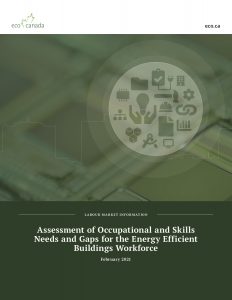
Push toward energy-efficient buildings requires updated skill sets
March 2, 2021 | By HPAC Magazine
New report outlines the capacity of the current workforce and what will be required as Canada’s buildings transition to more energy efficient solutions.

Environmental Careers Organization (ECO) Canada, a federally-funded environmental workforce development agency, has released a report on the opportunities and gaps in the building construction sector as Canada works towards more energy efficiency and net-zero emissions by 2050.
The report, Assessment of Occupational and Skills Needs and Gaps for the Energy Efficient Buildings Workforce, outlines the capacity of the current workforce and what will be required as Canada’s buildings transition to more energy efficient solutions.
Canada’s built environment, including new and existing commercial, institutional, and multi-unit residential buildings, has been acknowledged as the country’s “lowest-hanging fruit” in the reduction of carbon emissions.
The ECO Canada report found that energy efficient buildings require a “building-as-a-system” mindset because energy efficiency is optimized through integrated processes throughout a building’s life cycle.
The process requires a collaborative approach among multiple disciplines, from design and engineering professionals, energy managers, construction and trade workers to building operators. Traditionally, these disciplines worked on a sequential approach from design to construction, commissioning, management, and retrofitting.
The report suggests that in order to optimize a building’s performance over time requires a workforce culture shift, and these issues are also compounded by labour shortages due to challenges in attracting new talent to the building construction sector and an aging workforce, especially as knowledge and experience are lost with retiring workers.
“For Canada’s buildings to become more energy efficient, there has to be a workforce that is able to meet the demands of that effort,” said Kevin Nilsen, president and CEO of ECO Canada. “This research shows the gaps in labour and skills that need to be addressed in order to meet the Government of Canada’s Build Smart strategy, and the timeline of energy efficiency being the norm by 2030.”
Assessment of Occupational and Skills Needs and Gaps for the Energy Efficient Buildings Workforce also outlines recommendations for industry, government, and post-secondary institutions to develop solutions to address the workforce issues facing the building sector.
Key recommendations include working together to improve the sector’s attractiveness, develop a hiring forecast, and align education and training to address skills gaps.
In its final section the report says, “The industry will need to focus on employee retention, support diversity and inclusion, and develop lifelong learning practices in order for workers to stay relevant and effective in this changing environment.”
The study produced with funding from Natural Resources Canada’s Office of Energy Efficiency Buildings and Industry Division and the Government of Canada’s Sectoral Initiatives Program.
To download the full report: www.eco.ca/research/report/energy-efficiency-in-buildings/




